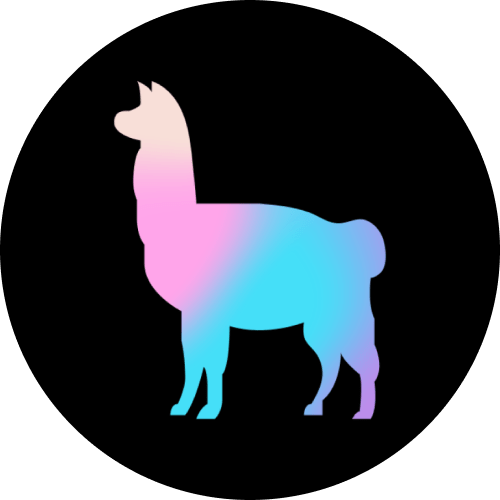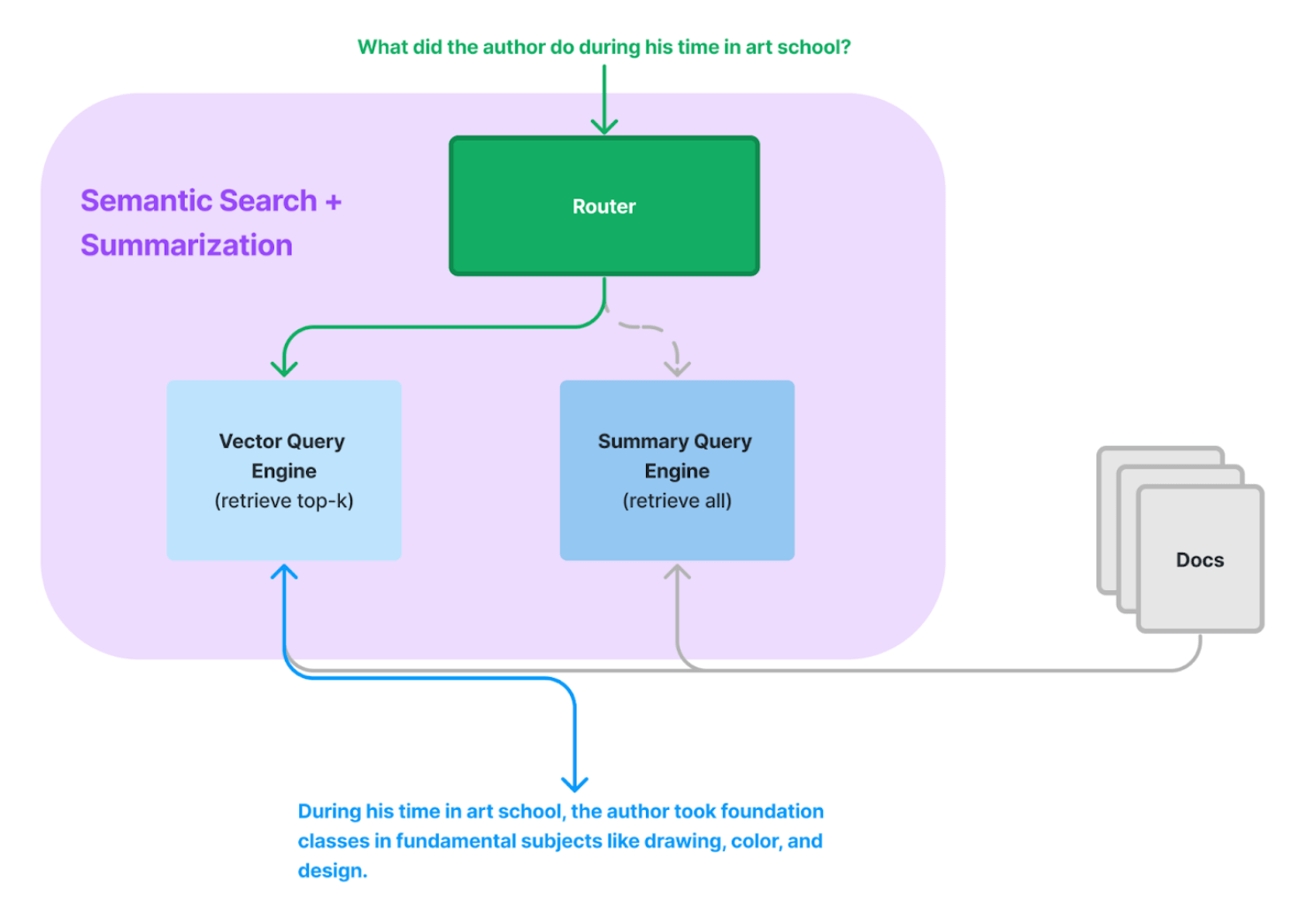RAG in 2024:
advancing to agents

2024-06-06 YouTube
What are we talking about?
- What is LlamaIndex
- Limitations of RAG
- Building an agent in 2024
- Components of an agent
- Routing
- Memory
- Planning
- Tool use
- Agentic reasoning
- Sequential
- DAG-based
- Tree-based
What is LlamaIndex?
Python: docs.llamaindex.ai
TypeScript: ts.llamaindex.ai
LlamaCloud
LlamaParse
Free for 1000 pages/day!
The RAG pipeline

5 line starter
# load and parse
documents = SimpleDirectoryReader("data").load_data()
# embed and index
index = VectorStoreIndex.from_documents(documents)
# generate query engine
query_engine = index.as_query_engine()
# run queries
response = query_engine.query("What did the author do growing up?")
print(response)Naive RAG is limited

Summarization
Naive RAG failure modes:
Comparison
Naive RAG failure modes:
Implicit data
Naive RAG failure modes:
Multi-part questions
Naive RAG failure modes:
RAG is necessary
but not sufficient
Two ways
to improve RAG:
- Improve your data
- Improve your querying

Improving data quality with LlamaParse
Quality through quantity: LlamaHub.ai
RAG pipeline

⚠️ Single-shot
⚠️ No query understanding/planning
⚠️ No tool use
⚠️ No reflection, error correction
⚠️ No memory (stateless)
Agentic RAG

✅ Multi-turn
✅ Query / task planning layer
✅ Tool interface for external environment
✅ Reflection
✅ Memory for personalization
From simple to advanced agents

Routing

RouterQueryEngine
list_tool = QueryEngineTool.from_defaults(
query_engine=list_query_engine,
description=(
"Useful for summarization questions related to Paul Graham eassy on"
" What I Worked On."
),
)
vector_tool = QueryEngineTool.from_defaults(
query_engine=vector_query_engine,
description=(
"Useful for retrieving specific context from Paul Graham essay on What"
" I Worked On."
),
)
query_engine = RouterQueryEngine(
selector=LLMSingleSelector.from_defaults(),
query_engine_tools=[
list_tool,
vector_tool,
],
)Conversation memory

Chat Engine
# load and parse
documents = SimpleDirectoryReader("data").load_data()
# embed and index
index = VectorStoreIndex.from_documents(documents)
# generate chat engine
chat_engine = index.as_chat_engine()
# start chatting
response = query_engine.chat("What did the author do growing up?")
print(response)Query planning

Sub Question Query Engine
# set up list of tools
query_engine_tools = [
QueryEngineTool(
query_engine=vector_query_engine,
metadata=ToolMetadata(
name="pg_essay",
description="Paul Graham essay on What I Worked On",
),
),
# more query engine tools here
]
# create engine from tools
query_engine = SubQuestionQueryEngine.from_defaults(
query_engine_tools=query_engine_tools,
use_async=True,
)Tool use

Basic ReAct agent
# define sample Tool
def multiply(a: int, b: int) -> int:
"""Multiply two integers and returns the result integer"""
return a * b
multiply_tool = FunctionTool.from_defaults(fn=multiply)
# initialize ReAct agent
agent = ReActAgent.from_tools(
[
multiply_tool
# other tools here
],
verbose=True
)Combine agentic strategies
and then go further
- Routing
- Memory
- Planning
- Tool use
Agentic strategies
- Multi-turn
- Reasoning
- Reflection
Full agent
3 agent
reasoning loops
- Sequential
- DAG-based
- Tree-based
Sequential reasoning

ReAct in action
Thought: I need to use a tool to help me answer the question.
Action: multiply
Action Input: {"a": 2, "b": 4}
Observation: 8
Thought: I need to use a tool to help me answer the question.
Action: add
Action Input: {"a": 20, "b": 8}
Observation: 28
Thought: I can answer without using any more tools.
Answer: 28DAG-based reasoning

Self reflection

Structured Planning Agent
# create the function calling worker for reasoning
worker = FunctionCallingAgentWorker.from_tools(
[lyft_tool, uber_tool], verbose=True
)
# wrap the worker in the top-level planner
agent = StructuredPlannerAgent(
worker, tools=[lyft_tool, uber_tool], verbose=True
)
response = agent.chat(
"Summarize the key risk factors for Lyft and Uber in their 2021 10-K filings."
)The Plan
=== Initial plan ===
Extract Lyft Risk Factors:
Summarize the key risk factors from Lyft's 2021 10-K filing. -> A summary of the key risk factors for Lyft as outlined in their 2021 10-K filing.
deps: []
Extract Uber Risk Factors:
Summarize the key risk factors from Uber's 2021 10-K filing. -> A summary of the key risk factors for Uber as outlined in their 2021 10-K filing.
deps: []
Combine Risk Factors Summaries:
Combine the summaries of key risk factors for Lyft and Uber from their 2021 10-K filings into a comprehensive overview. -> A comprehensive summary of the key risk factors for both Lyft and Uber as outlined in their respective 2021 10-K filings.
deps: ['Extract Lyft Risk Factors', 'Extract Uber Risk Factors']Tree-based reasoning

Exploration vs exploitation
Language Agent Tree Search
agent_worker = LATSAgentWorker.from_tools(
query_engine_tools,
llm=llm,
num_expansions=2,
max_rollouts=3,
verbose=True,
)
agent = agent.as_worker()
task = agent.create_task(
"Given the risk factors of Uber and Lyft described in their 10K files, "
"which company is performing better? Please use concrete numbers to inform your decision."
)Taking stock
Still to come:
- Controllability
- Observability
- Customizability
- Multi-agents
Observability
Controllability
Customizability
What's next?
Multi-agent interactions
Recap
All resources:

- Basic RAG
- Agent components
- Routing
- Memory
- Planning
- Tool use
- Agentic reasoning
- Sequential
- DAG-based
- Tree-based
- Observability
- Controllability
- Customizability
Thanks!
All resources:

Follow me on Twitter:
@seldo
Please don't add me on LinkedIn.
RAG in 2024: advancing to agents (YouTube edition)
By Laurie Voss
RAG in 2024: advancing to agents (YouTube edition)
- 1,330



